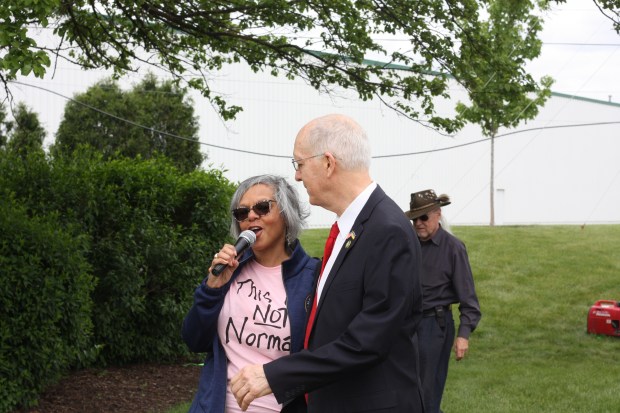When I was 9 years old and the starting pitcher for the Giants in Evergreen Park’s junior league, I remember my devastation after losing our first game by walking 13 batters over three innings. Afterward, my mother greeted me with a hug, an ice-cold bottle of Hires Root Beer and the welcome consolation that only two of my opponents were actually able to hit my wicked pitches.
When I was 10 and I gifted my mother a bouquet of flowers on Mother’s Day that I found in the alley behind Mitzie’s Florist at 95th and California — which caused Pee-wee Janus from across the street to razz me for being a “garbage picker” — Mom exclaimed they were the most beautiful flowers she had ever seen.
In sixth grade, when I received my first pair of eyeglasses and Randy Murphy kept slapping me in the head and calling me “four eyes” from the desk behind me, Mom said Randy was just jealous for not being as handsome as I was. And when she led me into the bathroom, combed my hair in front of the mirror and then tickled me to make me smile, I believed her.
This Mother’s Day, I don’t think I’m going out on a limb by saying that my mom, Gertrude McGrath, essentially invented the participation trophy. Not the actual statue made out of gold-painted metal or plastic with a wooden or marble base. Rather, she pioneered the concept in the 1960s of presenting a trophy or, at least, soothing a child with compliments, even when they do not win.
Parents know the drill: Sally comes home with a trophy of a 4-inch-tall soccer player on a pedestal inscribed with the words, “For Outstanding Effort!” Or Johnny pulls a trophy out of his book bag that says, “Junior League Baseball Teamwork.”
You hug and congratulate your kid, despite knowing that everybody on their team got a trophy, even though they won but one game all year, and that was by forfeit.
Such trophies have been reviled by some old-school parents and tough, Mike Ditka-style coaches. The belief is that these trophies make kids soft and incentivizes laziness and lukewarm effort since they know they’ll get by and even rewarded for doing nothing at all.
Which is just not true, according to child psychologist Dr. Candida Fink, who in a 2023 Psychology Today article writes that participation trophies are good for children insofar as they build their confidence and bolster the social dynamic with their peers. “Participation trophies are protective of children’s mental health by giving them soft places to land in the rocky terrain that is childhood,” Fink argues.
The notion that the trophies destroy kids’ competitive spirit is “ludicrous,” Fink asserts. “As kids get older, their strengths and interests develop more clearly and they will become involved in more competitive activities that will measure their abilities … and provide plenty of trophies and rewards that will single out some kids for recognition while leaving other kids out entirely.
“The argument that participation trophies somehow keep kids from experiencing the ‘real world’ of winning and losing crumbles in this context.”
Though I am not a child psychologist, I was a child who remembers that my mother’s praise in the face of my losing efforts made me feel better and even sleep better at night, even as I still understood the truth of needing to practice my pitching more with my older brother if I ever wanted to find the strike zone.
Clearly, Gert McGrath was instinctively aware of these truths before Fink was even born. Throughout my formative years, she touted my intelligence, athleticism, artistic and musical talent, and good looks, with the implication that I must have been anointed by the Holy Ghost from birth — even though an objective observer such as a babysitter likely concluded I was the worst kid in the McGrath family with the grimmest-looking future. And there were eight of us.
In seventh grade, when I thought myself a shoe-in to win an American Legion essay contest but ended up losing to Tom Baker, whose short piece about patriotism didn’t even contain fancy vocabulary words, Mom came through again, raving over my paper’s Pulitzer Prize-level quality and giving me a present the next day of a writer’s notebook with a faux leather cover for my future pearls of wisdom and wordsmithery.
Some might consider such a gift a curse that gives false hope, setting up the recipient for emotional collapse when they fail.
Not in my case, thanks to Mom. Though I amassed a couple of hundred rejection slips from publishers and editors, I continued to toil away at the keyboard till acceptances started trickling in.
With Gertrude McGrath’s help, I was able to cultivate an art that has given my life purpose and fulfillment, if not riches, in ways that nothing else could.
So happy Mother’s Day to all of you mothers out there, and please don’t ever hesitate to reward, praise, coddle and love your children.
David McGrath is an emeritus English professor at the College of DuPage and author of the newly released book “Far Enough Away,” a collection of Chicagoland stories. Email him at profmcgrath2004@yahoo.com.
Submit a letter, of no more than 400 words, to the editor here or email letters@chicagotribune.com.



